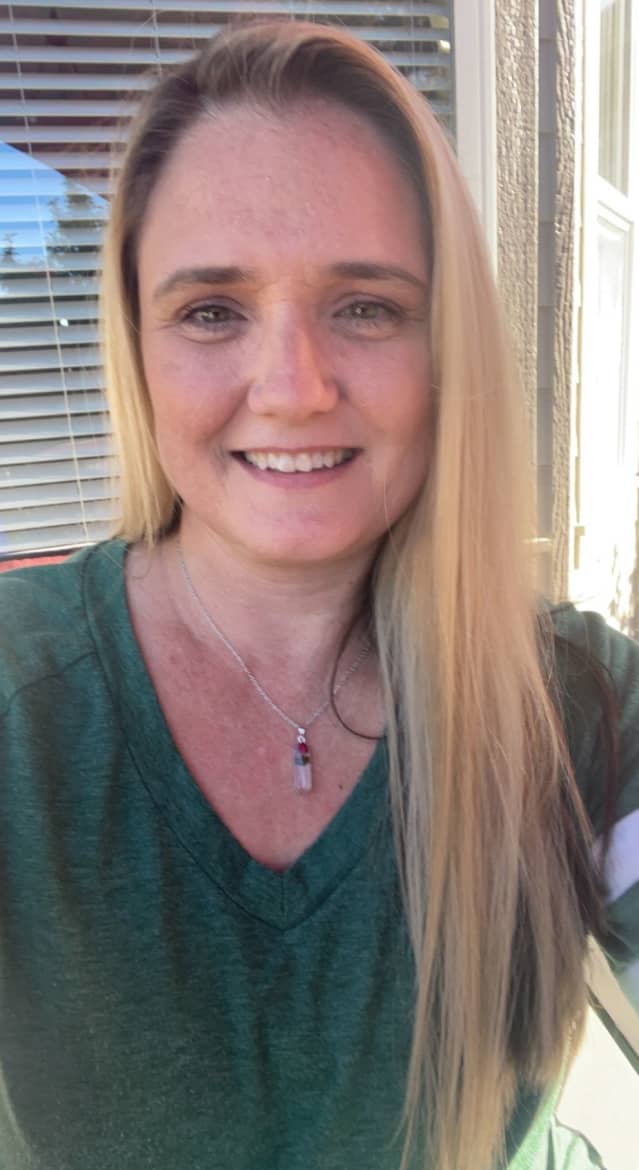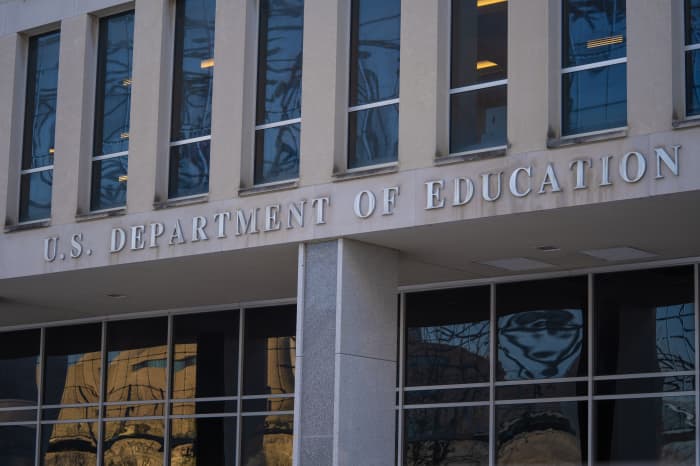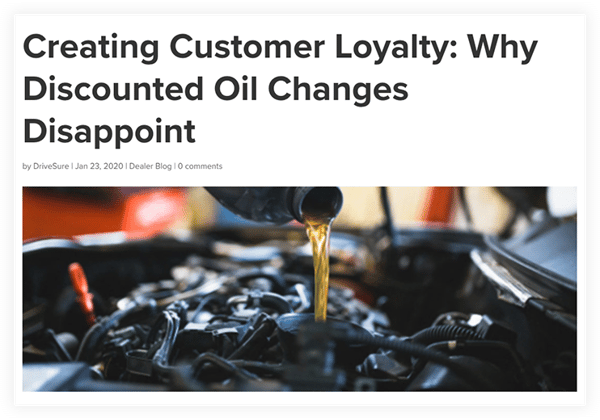‘I was the sole provider’: First-generation college graduate had a perilous path to her degree. Two decades later, she still has a $80,000 student

Table of Contents
When Trisha Volosin enrolled in a college as a solitary mom, she hoped to develop into the very first in her biological family members to make a bachelor’s diploma. Minor did she expect that expertise to saddle her with hundreds of pounds in scholar-personal loan personal debt 20 many years afterwards.
At the age of 24, with a new child in hand and as the sole breadwinner for her loved ones, Volosin enrolled in a for-revenue on the net school, the now-defunct Kaplan University, with the objective of earning her accounting degree and securing a complete-time function as an accountant at her current agency.
Kaplan College is a person of many academic institutions previously owned by Kaplan Greater Schooling. Kaplan Higher Education and learning was the father or mother corporation of Kaplan Profession Institute, and Kaplan College or university, and also formerly Kaplan University. Kaplan University was marketed to Purdue College.

The two-ten years journey by means of college has still left Trish Volosin owing $83,721.71.
Trish Volosin
The mother or father corporation has had a tough previous. Scenario in position: Kaplan University, which was owned by Kaplan Bigger Instruction, paid out a fine of much more than $1.3 million to the Section of Justice for its Texas campuses allegedly employing unqualified instructors for a significant application the company did not confess legal responsibility.
(The business did not react to a ask for for remark.)
Volosin’s opportunity to update her lifetime soon became a nightmare: Private tragedy struck, forcing her to consider a move back again, and the college’s baffling instructions on the credits and courses she necessary to just take to graduate delayed her graduation and included supplemental fees to the diploma.
Dollars from tax refunds, money from her foster family, and extra paychecks from her accounting task, all went in direction of spending off her degree, which she began in 2002 and concluded in 2014.
The two-decade journey via greater instruction has left Volosin owing $83,721.71 in fantastic financial loans.
Volosin and her present partner have been dutifully shelling out down that financial debt, in spite of feeling like Kaplan College had designed her choose further credits and spend as a result of the enamel for the diploma she did not end at the college.
“‘We’re seriously frightened about when things kick back in, due to the fact everything’s been truly limited as it is.’”
Prior to the pandemic payment pause on federal university student loans that previous President Donald Trump enacted in March 2020, she had been paying about $300 a month in credit card debt she owed to the Office of Schooling.
But with inflation pushing the price of all the things — from fuel to kid treatment — greater, Volosin said she’s anxious about what will happen when the payment pause expires.
“We’re really terrified about when items kick back again in, simply because everything’s been actually restricted as it is,” Volosin, a indigenous of Medford, Ore., informed MarketWatch. “And if these kick back again in, it’ll really kill us.”
Volosin’s circumstance is significantly like the tens of millions of other pupil debtors who face a resumption of month-to-month financial loan payments appear September.
Some 40 million debtors hold $1.6 trillion in federal university student financial loan financial debt. The payment pause is established to expire on Aug. 31. Meanwhile, President Joe Biden is reportedly taking into consideration canceling at least $10,000 in pupil personal debt for every borrower by late summer season, according to the Wall Street Journal.
Need to the pause expire, devoid of any financial debt cancellation, Volosin believed that she would owe $400 a thirty day period on her scholar personal debt — about 10% of her residence income.
“We went from shelling out $150 in fuel a month for my partner to get to and from do the job to now paying out more than $400 for each month,” she extra. “Our groceries have doubled in rate, and we are not acquiring as a great deal as we did a calendar year ago at this time. It would necessarily mean not finding to do something fun for and with our minimal kinds.”
Volosin’s path to higher education was a complicated 1
Likely via a “horrible childhood” in which bodily abuse was prevalent, Volosin documented her father to the authorities at the age of 12, and she and her three siblings entered the foster-care process.
It was then that she decided to go to college or university. “No one particular graduated substantial faculty. No 1 went on to college or university,” she reported.
Right after heading by numerous houses, she finished up with a household that took her in as their very own. She graduated large college 6 months early. She had even been acknowledged into the University of Colorado Boulder.
But she couldn’t manage it at the time. She experienced still left her foster family’s house right after slipping out with them and was living in a shelter residence.
By the age of 24, Volosin was a mom. It was then when she “really felt the pull to go back again to college or university,” she recalled. “I definitely necessary to give my daughter something to appear up to, for the reason that none of my household was very good. I needed her to see that I was able of carrying out it.”
She was also not acquiring the part she needed because she did not have a faculty diploma. So cradling her new child, Volosin appeared up on-line college or university selections that she could take care of even though doing the job complete-time.
“I was the sole supplier of our family,” Volosin said. “We ended up lower-income, and so I could not give up my occupation.”
She attempted out the College of Phoenix. It did not get the job done. Then she tried out Kaplan University. It accepted her, and she commenced her school journey.
Volosin experienced a number of particular losses that speedily derailed her options: Her sister, her mother, and her stepmother passed away and she went through a divorce.
“It was all so difficult and all at once, but I finished up not even focusing on college,” she recalled. She finished up withdrawing quickly.
Following pulling herself with each other, conquering the tragedies, she re-enrolled, right after paying out a harmony.
“‘$900 a month dollars — as a one mother. I was barely producing it. I believe I was generating $11.85 an hour then.’”
But she saved hitting speed bumps. She initial experienced to pay a balance to get back again into the faculty, which she did.
Volosin explained she was requested to fork out additional for the courses, as she had taken the utmost amount of money of fiscal help allowable. That included $993 to her monthly bills, she mentioned.
“$900 a thirty day period income — as a solitary mother. I was scarcely earning it,” Volosin reported. “I believe I was making $11.85 an hour then.”
Annoyed, at that stage, she made a decision to improve tack. Perhaps the faculty was the trouble, not her. Volosin went to a regional university in Oregon.
She observed out that she could not enroll there, since she experienced no financial support still left to draw on. Undeterred, she located a way to discuss with the tutorial advisors at Southern Oregon College.
Finally, she caught a crack. The university explained she could just take some of her credits to qualify for an accounting diploma. She re-enrolled, after all over again.
She made use of tax refunds. She experienced reunited with her foster household, who helped out as effectively. She applied additional paychecks she obtained from her accounting gig.
In 2014, she last but not least turned a happy to start with-technology school graduate.

Volosin’s credit card debt is owed to the Department of Education and learning, which disburses monetary assist to thousands of accredited faculties across the country.
Photo: Getty Images
But Volosin’s battle by the for-gain school is not an uncommon a person, Kyra Taylor, a personnel lawyer at the Countrywide Client Legislation Heart, informed MarketWatch.
“We commonly see college students who attended multiple establishments, and often attended a number of sorts of establishments — for-revenue, non-income, online, in-man or woman, etcetera — in their pursuit to get an schooling that will open up much more job prospects,” said Taylor, but the credits do not transfer neatly.
“So when a scholar tries to decide up the place they remaining off, they are instructed to go again to the beginning and start their software at the new college with out any credit history for what they’ve uncovered in the previous,” she mentioned.
This leaves several “who attempt to finish their diploma just after periods away from faculty … frequently saddled with drastically a lot more debt,” Taylor stressed.
“‘We frequently see learners who attended numerous institutions, and normally attended numerous types of establishments — for-profit, non-revenue, on line, in-man or woman, etcetera.”
The attorney advised debtors who ended up in Volosin’s footwear to assess whether or not they can implement for personal debt reduction from the Education and learning Division, particularly if they had been misled by the faculty.
These debtors “should look at applying for borrower defense to reimbursement, a authorities application which cancels the money owed of borrowers who have been harmed by a school’s misrepresentations or omissions when they ended up enrolling,” Taylor described.
“The actuality is that borrowers generally do not know what aid is obtainable and don’t know that all that stands amongst them and finish federal bank loan cancellation is an software to the Section of Instruction.”
For Volosin, the debt has hung above her like a shadow. It has adopted her by a further relationship, and now with three young children now in tow, it continues to be a substantial component of the money burden she’s dealing with.
With the payment pause, at minimum there was a reprieve. “With the scholar-personal loan pause we have been ready to cover all of our charges and thankfully we had a tiny wiggle place for the price tag of inflation,” Volosin said.
But ought to an unexpected emergency occur with their residence, or their car or truck, that would be something their spouse and children wouldn’t be equipped to find the money for, she included.
And as the president mulls canceling credit card debt, Volosin mentioned any assistance from the federal government was welcome.
“Canceling $10,000 of our scholar mortgage would not assistance in our condition considering that we owe so significantly, and payments are primarily based on money,” Volosin said. “We would not say no, but it won’t adjust anything for our family.”
Publish to: [email protected]







